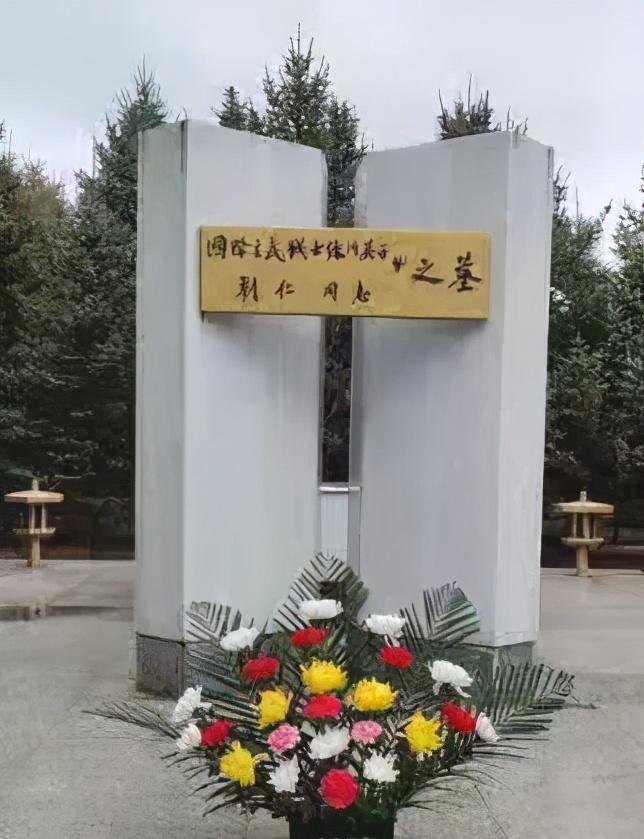<h1 class="pgc-h-arrow-right" data-track="1" > Jiamusi, Heilongjiang: Sweeping the graves of the internationalist warrior Esperanto writer Hideko Midorikawa</h1>
Original Liu Xiumei
On April 1, the Preparatory Committee of the Heilongjiang Jiamusi Esperanto Association organized more than ten Esperanto speakers to visit the Martyrs' Cemetery in the western suburbs of Jiamusi City to visit the internationalist fighter and Esperanto writer Hideko Midorikawa, who was buried here, and to jointly commemorate her contributions to China's War of Resistance Against Japanese Aggression and the International Anti-Fascist War. Wang Qingjia, president of the Heilongjiang Esperanto Association, attended the event.

The tombs of Hideko Midorikawa and Liu Ren
Upon arriving at the cemetery, Esperanto first cleaned the cemetery and presented flowers to Hideko Midorikawa. Afterwards, everyone observed a 3-minute silence to express their condolences.
The core members of the Preparatory Committee of the Jiamusi Esperanto Association took a group photo after the tomb sweeping activity
Liu Xiumei, an early enlightenment teacher of Jiamusi Esperanto, introduced the life of Hideko Midorikawa to the new Esperanto. President Wang Qingjia also encouraged everyone to follow the example of Hideko Midorikawa, learn Esperanto well, and make efforts and contributions to the development of Esperanto for our country to go global and for the development of Esperanto.
In 1984, some students of the first Jiamusi Esperanto training class took photos in front of the tomb of Hideko Midorikawa
Hideko Midorikawa, formerly known as Teruko Hasegawa, her Esperanto name is Verda Majo (i.e. "Green May"). Born in 1912 in Yamanashi Prefecture, Japan. In 1932, while studying at the Nara Women's Normal School, she began to learn Esperanto and participated in the left-wing cultural movement. In the spring of 1936, at an Esperanto event, she met Liu Ren, a Chinese student in Tokyo, and fell in love with him and married him. In 1937, on the eve of the full-scale outbreak of the War of Resistance Against Japanese Aggression in China, Hideko Midorikawa returned to China with Liu Ren and threw herself into the anti-Japanese torrent of the Chinese people. They successively participated in anti-Japanese activities in Shanghai, Guangzhou, and other places, and wrote a large number of articles exposing the various atrocities of Japanese imperialism. Hideko Midorikawa used Esperanto as a weapon to fight for the complete liberation of the Chinese people and the world proletariat.
Later, with the help of Guo Moruo, the couple came to Wuhan in 1938. Hideko Midorikawa joined the International Propaganda Department of the Propaganda Department of the Kuomintang Central Committee as a Japanese announcer for the Central Radio. In October 1938, Wuhan fell, and Hideko Midorikawa was forced to evacuate Hankou and move to chongqing, the rear area, to continue fighting. In Chongqing, Zhou Enlai met with Hideko Midorikawa and encouraged him to his face: "Japanese imperialism calls you a 'traitor to the country', but in fact you are a loyal and good daughter of the Japanese people and a true patriot." After hearing this, Hideko Midorikawa was deeply encouraged, and she said: "I am willing to be a loyal son and daughter of the Chinese and Japanese peoples." ”
After the victory of the Anti-Japanese War, Hideko Midorikawa and his wife arrived in the Northeast Liberated Area in 1945. She served as a member of the Northeast Education Commission and a researcher at the Northeast Institute of Social Surveys, and was invited to give lectures at Northeastern University.
On January 10, 1947, Hideko Midorikawa died of an surgical infection in Jiamusi City at the age of 35. On April 22 of the same year, her husband Liu Ren also died of pulmonary edema. Together, they left a son, Liu Xing, and a daughter, Liu Xiaolan.
In August 1983, with the approval of the Secretariat of the CPC Central Committee, the Jiamusi Municipal People's Government rebuilt the mausoleum and monument for Hideko Ando Midorikawa and his wife in the Martyrs' Cemetery. Chen Lei, the former governor of Heilongjiang Province, personally inscribed "The Tomb of the Internationalist Warrior Hideko Midorikawa and Liu Ren". In 1980, the first Sino-Japanese CO-production TV series "Wangxiang Star" told the story of Hideko Midorikawa.
Hideko Midorikawa is buried in the city of Jiamusi, and her internationalist spirit lives on forever. As Esperanto speakers, we are willing to dedicate our modest efforts to world peace like Hideko Midorikawa, and truly realize the ideal of Chaimenhof, the founder of Esperanto, the world unity.
Source: All-China Esperanto Association
<h1 class="pgc-h-arrow-right" data-track="1">
The easiest of the 7,000 foreign languages to learn is Esperanto </h1>
All-China Esperanto Association </h1>
International Esperanto Association </h1>